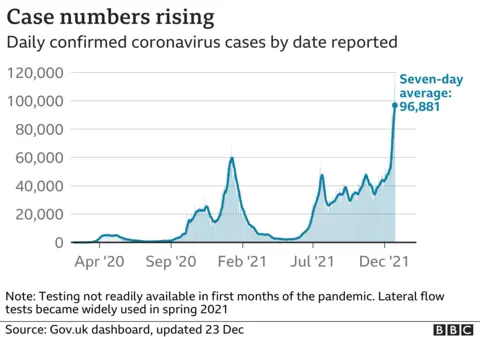Omicron: Rising numbers of NHS staff off work because of Covid
 Getty Images
Getty ImagesThe number of NHS staff off-work because of Covid is rising across England, official data shows.
Nearly 19,000 NHS staff were absent for Covid-related reasons on 19 December - up 54% on the previous week.
A further 119,789 Covid infections were recorded in the UK on Thursday, setting another new record for daily cases.
Health leaders say the NHS is under significant pressure, despite early studies suggesting the Omicron variant may cause a milder illness than Delta.
Ministers say they are monitoring Covid data but no further restrictions are needed in England at present.
Health Secretary Sajid Javid said the NHS workforce was "already under pressure before Omicron came along", adding: "There is increased pressure in many workforces at the moment, especially if someone needs to isolate if they have a positive case.
"Some of the recent moves we have had, moving from 10-day to seven isolation if you take a test in the last two days, I think all of that will help."
The 19,000 absentees include staff at NHS acute trusts who were ill with Covid-19 or who were having to self-isolate. In London, the number of staff absences due to Covid was almost 3,900 - more than double the number a week earlier.
Along with non-Covid reasons, this suggests about 5% of the NHS workforce in England was absent on 19 December.
Data for Scotland suggests 3,285 NHS staff were off for reasons related to Covid in the week to 21 December - up by almost 1,000 on the previous week - while the head of NHS Wales warned almost a fifth of its staff may be off work at the peak of the Omicron wave.
'A huge test'
NHS Providers' chief executive Chris Hopson said the figures showed Omicron was having a "real-time impact on service".
He added: "The next few weeks will present a huge test for the NHS on many fronts - coping with Covid-19, handling emergencies, working on the backlog where possible, and delivering boosters."
The latest figures show the number of beds occupied in NHS hospitals remains high - with 81,880 out of 89,991 adult beds full in England on 19 December.
However, ambulance handover delays have improved slightly - with about 20% of people waiting for more than 30 minutes to be handed over to accident and emergency in the week up to 19 December, down from 23% the week before.
Meanwhile, the Ministry of Defence says it is making 750 personnel from the Army, Royal Navy and RAF available to support the acceleration of the Covid booster programme in England and Scotland. The roles include administering vaccines and planning support.

The latest NHS figures come amid a debate about whether further restrictions are needed to stem the surge of the Omicron variant around the UK.
More than 100,000 daily Covid cases were recorded for the first time on Wednesday, while the Office for National Statistics estimates 1.3 million people in the UK would have tested positive for Covid on 16 December.
Scotland, Wales and Northern Ireland have all announced further measures to kick in from 26 December - but no further curbs have been announced in England.
Asked when people in England would get clarity on potential rule changes, Mr Javid said: "We do have clarity, the government has taken action already - the so-called Plan B.
"We're clear that there's no need for any kind of further restrictions of any type before Christmas but of course we will keep the situation under review."
Pressed again on potential rule changes after Christmas, Mr Javid added: "We're not planning any further announcements this week."
He did, however, urge people to exercise caution over the festive period.
"If you are meeting people who are more vulnerable... I think a really sensible thing to do is to take a lateral flow test and make sure you're negative," he said.
Early data from South Africa and studies in England and Scotland published on Wednesday suggest Omicron infections may be milder and lead to fewer hospital admissions.
Analysis by researchers at Imperial College London found around a 40% reduction in the risk of being admitted to hospital for a night or more compared with Delta, while an Edinburgh University study suggested there was a 65% lower risk of being hospitalised with Omicron - but it was based on only a few cases.
In South Africa, a study suggested Omicron patients were 70-80% less likely to need hospital treatment. However, it suggested there was no difference in outcomes for the few patients that ended up in hospital with Omicron.
Imperial College epidemiologist Prof Neil Ferguson said the research was "clearly good news to a degree" but warned the reduction was "not sufficient to dramatically change the modelling" and the speed at which Omicron was spreading could still mean hospitalisations "in numbers that could put the NHS in a difficult position".
The UK Health Security Agency is expected to publish early real-world data on Omicron later, which could give further indications of the variant's severity.
Meanwhile, Prof Francois Balloux, an expert in infectious disease and director of University College London's Genetics Institute, has said London is likely to be past the peak of Covid infections.
Speaking to BBC Radio 4's World At One programme, he said: "We are seeing the peak of the wave of the Omicron variant at least in London and probably also in other parts of the UK - or peaking soon.
"There's a bit of a lag between infections and cases - it takes a little while for people to test positive - so infections have probably peaked."

- THE HAIRY BIKERS CHRISTMAS SPECIAL: Si and Dave ride north to create the perfect festive feast
- FROM SPIDERMAN: HOMECOMING TO FROZEN: There's a film for everyone on BBC iPlayer

